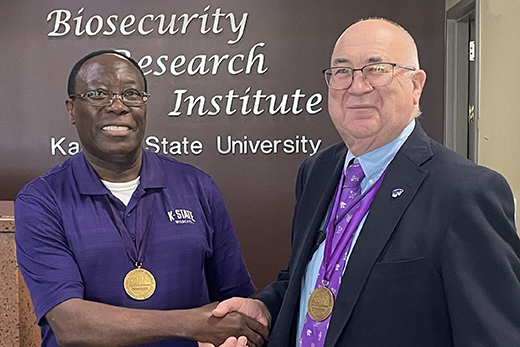April 7, 2023
Biosecurity Research Institute selects Mwangi for research fellowship
 |
Waithaka Mwangi, immunology professor, left, has been selected for Kansas State University's Biosecurity Research Institute Research Fellows Program. Stephen Higgs, associate vice president for research and director of the Biosecurity Research Institute, presents Mwangi with BRI Research Fellows medallion. |
The Biosecurity Research Institute at Kansas State University has selected Waithaka Mwangi, immunology professor, as a fellow in the 2023 Marty Vanier and Bob Krause BRI Research Fellows Program.
Mwangi has been with the K-State Department of Diagnostic Medicine/Pathobiology since 2016 and has more than 25 years of experience working on vaccine design and antigen delivery platforms in large outbred animal species.
Fourteen faculty members from the U.S. Department of Agriculture and K-State's colleges of Agriculture, Engineering and Veterinary Medicine have previously been named as fellows. The program was established in 2015. BRI Fellows meet regularly to discuss their research, emerging pathogens and One Health issues, funding opportunities that might be collaboratively pursued, and advice to support the continued success of the BRI.
"Dr. Mwangi brings a wealth of experience to the BRI Fellows and will enrich the discussions and expand future opportunities," said James Stack, professor of plant pathology and leader of the BRI Fellows.
Funding for the BRI Fellows Program was sponsored through an endowed gift from Marty Vanier and Bob Krause, who donated $10 million to support the BRI in 2013.
Employed in the College of Veterinary Medicine, Mwangi's research program seeks to develop prototype subunit vaccines. Safety, immunogenicity and protective efficacy of the vaccines are evaluated in the actual hosts, such as cattle and pigs. Other areas of interest include development of DIVA-compatible subunit vaccines for African swine fever virus, bovine viral diarrhea virus, bovine parainfluenza-3 virus, live-vectored SARS-Co-V-2 and Japanese encephalitis virus.
Mwangi's collaborative research is focused on the development of therapeutics against targets such as HIV and SARS-CoV-2 using novel cow antibodies — designated bovine ultralong CDR H3 structures — whose structure and mechanism for creating diversity have not been seen before in other animals' antibodies.
Mwangi earned a bachelor's degree in biochemistry and parasitology from the University of Nairobi, Kenya, in 1990. He completed a doctorate in 2002 and postdoctoral training in immunology in 2004, both at Washington State University.
